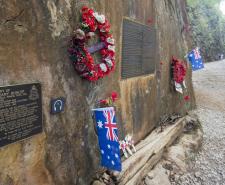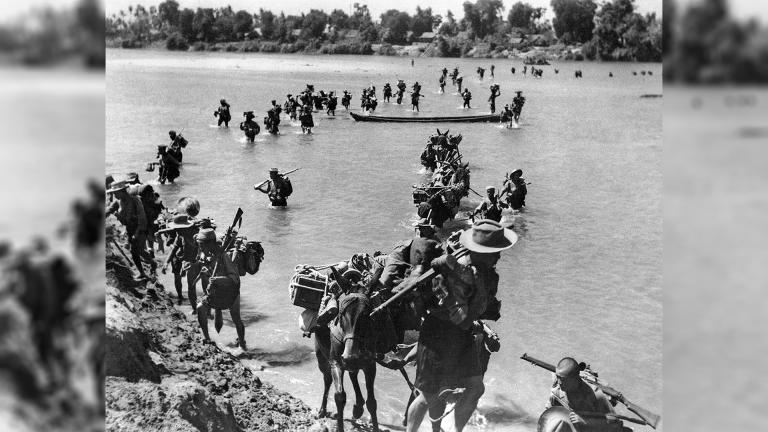
Read more about WW2

Not long after the bombing of Pearl Harbor, Japan invaded and occupied the British colony of Burma. Over the next few years, until 1945, Commonwealth and Chinese forces fought to get control of the land back.
Yet few people in Britain today remember the Burma Campaign in World War II. How could such a lengthy conflict go forgotten?
Sky HISTORY's upcoming series The Last Burma Star pays tribute to the surviving veterans of the Burma Campaign, particularly those from Burma who fought valiantly alongside British and Commonwealth forces. Read on to discover just what happened in Burma.
In early 1942, Japanese troops captured Burma – the country we now call Myanmar. One of their aims in doing this was to block supplies to China that came along the Burma Road.
The Allied troops were forced to retreat to India in a painful, deadly journey of 1,000 miles. Through the rest of 1942, they struggled to regain land but failed. In 1943, however, the tide started to turn a little in the Allies’ favour as they adopted better strategies. And in 1944, months of brutal fighting allowed the Allied forces to start pushing the Japanese troops back out.
By May 1945, the capital city, Rangoon, belonged to the Allies again, and the Burma Campaign was drawing to an end. The Allies had won.
Even during the war, the Burmese Campaign was not at the forefront of British strategy or public awareness. This happened for several reasons.
A major one was that the Allies had adopted a ‘Germany first’ or ‘Europe first’ strategy. They had decided that the most important foe to defeat was the Nazis, so Europe was where they would focus their efforts, troops and supplies.
It was also more difficult for the British public to get news about the Burma campaign, due to Burma’s physical distance and a lack of journalists who would bring back information. And people in Britain were more worried about the Nazi threat because of Germany’s closeness. During the Blitz, many civilians in Britain gained first-hand experience of Nazi bombs. The Burma Campaign, on the other hand, didn’t affect their lives as much.
Another reason for the Burma Campaign’s obscurity – at the time and later on – was that it was not good for morale. Put simply, the Allied forces had not fared well in the earlier years of the campaign. Nobody wanted to dwell on a succession of losses.
As a result of these factors and others, the Burma Campaign received less attention while it was ongoing. And a continued historical focus on other areas of war has helped the fighting in Burma to be further forgotten.
Although the British government had little to boast about at the start of the Burma Campaign, they did take some pride in its ending.
In 1947, the Prime Minister, Clement Attlee, said in Parliament:
‘We all know, and it is not necessary for me to repeat, the tragic story of the over-running of most of Burma by the Japanese, of the heroic retreat conducted by Lord Alexander, and of the ever memorable exploits of the forces under Admiral Lord Mountbatten which led to the freeing of the country.’
Today, historians tend to praise Field Marshal William Slim at least as much as Mountbatten for the successful strategies that won back Burma.
The ‘forgotten war’ of the Burma Campaign more than deserves to be recalled today.
The Fourteenth Army, which fought in Burma, is sometimes called the 'forgotten army'. But it was huge, consisting of around one million men. Its forces included Gurkhas, members of the British Indian Army, Commonwealth soldiers like the 11th East African Division, and soldiers from Burma and Britain. Not all of the soldiers who fought in Burma received the Burma Star for their actions, as they should have. So it’s even more important for us to remember them.
Also, when we remember the campaign in Burma, we also have to remember the building of the Burma Railway – a horrifically cruel part of the war.
On a larger scale, the Burma Campaign had a significant influence on the region. Both India and Burma gained independence from Britain just two years after the war’s end. As Attlee said:
‘These events had, naturally, a profound effect on the people of Burma. They gave increased impetus to the already strong urge of the peoples of Asia for self determination …’
It’s also fair to say that the Burma Campaign led to further conflicts, too, ranging from wars in Vietnam and Korea to fighting in Burma and modern Myanmar in the decades since the war.
Looking for more insights into parts of history you haven’t heard of? We’ve got them for you. To get started, sign up to the Sky HISTORY Newsletter for the latest news, shows, and articles.